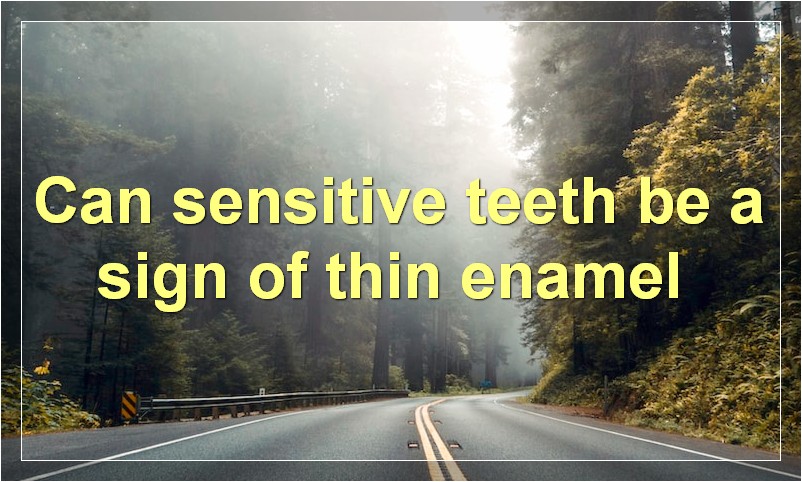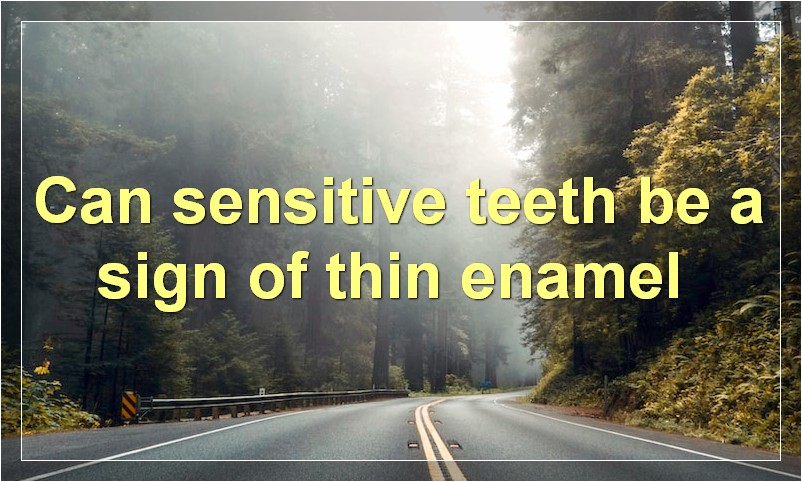If your teeth feel sensitive to hot and cold temperatures or you’re noticing that your enamel is thinning, you might have a problem. Here’s what you need to know about sensitive teeth and how to spot thin enamel.
What are the most common signs of thin enamel?
What are the most common signs of thin enamel?
Most people don’t give much thought to their tooth enamel, but this hard, white substance plays a vital role in protecting your teeth. Enamel is the hardest tissue in your body, but it can still be damaged by acidic foods and drinks, grinding your teeth, and other habits. When enamel is worn away, it’s called tooth erosion.
There are several signs that you may have thinning enamel. If your teeth look yellow or translucent, this may be a sign that your enamel is getting thinner. You may also notice that your teeth are more sensitive to hot and cold temperatures. If you have tooth pain when you bite down, this may also be a sign of erosion.
If you think you may have thinning enamel, it’s important to see a dentist so they can diagnose the problem and recommend treatment. Treatment for tooth erosion may include changes to your diet, fluoride treatments, and wearing a nightguard if you grind your teeth.
Can sensitive teeth be a sign of thin enamel?

Sensitive teeth can be a sign of thin enamel. Enamel is the protective outer layer of your teeth and it can wear down over time. This can happen from grinding your teeth, using tooth whiteners, or eating acidic foods. When your enamel wears down, your teeth can become sensitive to hot and cold temperatures. If you have sensitive teeth, you may want to see your dentist to find out if you have thin enamel.
How does tooth enamel become thin?
When it comes to your oral health, your tooth enamel is the first line of defense against cavities and other problems. This hard outer layer protects the softer, inner tissue of your teeth from the acids and bacteria that are present in your mouth. However, your tooth enamel can become thin for a variety of reasons, which can leave your teeth more vulnerable to decay.
One of the most common ways that tooth enamel becomes thin is through wear and tear. As you age, your tooth enamel naturally begins to wears down, exposing the inner layers of your teeth. This process can be accelerated by habits like grinding your teeth or using abrasive toothpaste. Additionally, acidic foods and drinks can also eat away at your tooth enamel, making it thinner over time.
Certain medical conditions can also lead to thinning tooth enamel. Gastric reflux disease, for example, can cause stomach acids to wash back up into your mouth, where they can damage your tooth enamel. Other conditions, like bulimia and anorexia, can also cause damage to tooth enamel due to the frequent exposure to stomach acids.
Fortunately, there are ways to prevent or slow the thinning of your tooth enamel. Good oral hygiene habits like brushing twice a day and flossing regularly can help remove plaque and prevent acid buildup on your teeth. Additionally, using a fluoride-rich toothpaste can help replenish the minerals in your tooth enamel, making it stronger and more resistant to damage. Finally, avoiding acidic foods and drinks can also help keep your tooth enamel intact.
Why is it important to maintain healthy tooth enamel?
When it comes to your teeth, enamel is everything. It’s the hard, protective outer layer that shields the more vulnerable inner layers from the forces of biting, chewing and grinding. Enamel also protects your teeth against the acids in plaque and in the foods and drinks you consume.
Your tooth enamel starts to form before you are born. Once your baby teeth erupt, enamel is continually being produced, but it doesn’t last forever. In fact, once tooth enamel starts to break down, it cannot be repaired. That’s why it’s so important to take steps to protect your tooth enamel and keep it healthy.
Here are some tips for maintaining healthy tooth enamel:
1. Brush your teeth twice a day with a soft-bristled toothbrush.
2. Use a fluoride toothpaste. Fluoride helps to remineralize tooth enamel and prevent cavities.
3. Avoid brushing too hard. Brushing too hard can damage tooth enamel.
4. Use a mouthrinse containing fluoride.
5. Eat a balanced diet and limit sugary snacks and drinks. Too much sugar can lead to cavities.
6. Quit smoking. Smoking can stain teeth and damage gum tissue.
What foods and drinks can contribute to thinning enamel?
When it comes to our teeth, we often think of enamel as something that is strong and durable. However, there are certain foods and drinks that can contribute to thinning enamel. Here are some of the most common offenders:
1. Soda – The high levels of acidity in soda can wear away at tooth enamel. Diet sodas are particularly problematic because they also contain sugar substitutes that can be just as damaging to teeth.
2. Coffee – Like soda, coffee is also quite acidic. In addition, many people add sugar or other sweeteners to their coffee, which can further contribute to enamel erosion.
3. Wine – Both red and white wine can be problematic for teeth. The acidity in wine can wear away at enamel, and the tannins in red wine can cause staining.
4. citrus fruits – The acidity in citrus fruits can also contribute to thinning enamel. In addition, the citric acid can cause tooth sensitivity.
5. Sweets – Sugary sweets are not only bad for your waistline, but they’re also bad for your teeth. The sugar in sweets can promote tooth decay and cavities.
If you enjoy any of the above foods or drinks, you don’t have to give them up entirely. Just be sure to brush your teeth afterwards to help remove any acids or sugars that may have been left behind on your teeth.
What are some ways to prevent thinning enamel?

Your enamel is what protects your teeth from the everyday wear and tear of chewing, biting and grinding. But over time, it can become thinner due to certain habits or conditions. Here are some ways you can prevent your enamel from thinning:
1. Avoid acidic foods and drinks.
Acidic foods and drinks can break down your enamel, so it’s important to limit them in your diet. If you do consume acidic foods or drinks, be sure to brush your teeth afterwards to remove the acid.
2. Don’t brush too hard.
Brushing your teeth too hard can actually damage your enamel. Be sure to use a soft-bristled toothbrush and gentle strokes when brushing.
3. Quit smoking.
Smoking is one of the worst things you can do for your oral health. Not only does it stain your teeth, but it also increases your risk for gum disease and oral cancer. If you smoke, quitting is the best thing you can do for your teeth and overall health.
4. Use fluoride toothpaste.
Fluoride is a mineral that helps strengthen your enamel. Be sure to use a toothpaste that contains fluoride, and consider using a fluoride mouthwash as well.
5. See your dentist regularly.
Regular dental checkups and cleanings are important for keeping your teeth and gums healthy. During these appointments, your dentist can identify any issues early on and provide treatment to help prevent further damage.
How can I tell if my child has thin enamel?
You can tell if your child has thin enamel by looking at their teeth. If you see any white spots or discoloration on their teeth, this is a sign of thin enamel. You may also notice that your child’s teeth are more sensitive to hot and cold temperatures. If you are concerned about your child’s dental health, you should schedule an appointment with their dentist.
Is there a cure for thinning enamel?
A study published in the Journal of Dentistry found that people with thinning enamel are more likely to have cavities. The study authors say that people with thinning enamel are at an increased risk for cavities because the enamel is thinner and there is less protection against the acids that cause cavities. The study authors suggest that people with thinning enamel should see a dentist regularly and brush their teeth twice a day with a fluoride toothpaste.
What are the long-term effects of having thin enamel?
While the effects of having thin enamel may not be immediately apparent, over time they can cause a number of serious problems. The most obvious effect of thin enamel is an increased sensitivity to hot and cold temperatures. This can make eating and drinking uncomfortable, and can also lead to pain when exposed to extreme temperatures. In addition to this, thin enamel can also make teeth more susceptible to cavities and decay. Because the enamel is thinner, there is less protection against the acids that cause cavities. This means that people with thin enamel are more likely to develop cavities, and the cavities they do develop are likely to be larger and more severe.
In addition to the effects on teeth, thin enamel can also lead to gum disease. Gum disease is an infection of the gums that can damage the soft tissue and bone supporting the teeth. People with thin enamel are more susceptible to gum disease because the bacteria that cause the infection can more easily penetrate the tooth and reach the gum tissue. Once the bacteria reach the gum tissue, they can cause inflammation and irritation, which can lead to gum recession and eventually tooth loss.
While the long-term effects of having thin enamel can be serious, there are some things that can be done to help protect teeth and reduce the risk of developing these problems. One of the best things that people with thin enamel can do is to avoid foods and drinks that are high in acidity. Acidic foods and drinks can dissolve the enamel on teeth, so it is important to limit their consumption. In addition, people with thin enamel should brush their teeth twice a day with a toothpaste that contains fluoride. Fluoride helps to strengthen tooth enamel, which can help to protect teeth from cavities and decay. Finally, people with thin enamel should see their dentist regularly for professional cleanings and checkups. These appointments give your dentist a chance to inspect your teeth for any signs of problems and to provide you with advice on how to best care for your teeth.
Can tooth enamel grow back once it’s been damaged?
It’s a common misconception that tooth enamel can never grow back once it’s damaged. Enamel is the hardest substance in the human body, but it can be chipped, fractured, or worn away over time. While your body can’t regenerate new enamel, there are treatments available to help repair and strengthen damaged enamel.
Tooth enamel is the hard outer layer of your teeth that protects them from decay and damage. It’s made up of minerals, including calcium, phosphate, and fluoride. Enamel starts to form when you’re a baby and continues to develop until you’re about 8 years old. Once your enamel is fully formed, it won’t grow back if it’s damaged.
However, there are treatments available that can help to repair and strengthen damaged enamel. One common treatment is fluoride therapy, which involves using fluoride products to help re-mineralize and strengthen enamel. Other treatments include dental bonding and veneers, which can help to restore the appearance of your teeth.
If you’re concerned about damage to your tooth enamel, talk to your dentist. They can assess the severity of the damage and recommend the best course of treatment.




![How can I fix the [pii_email_019b690b20082ef76df6] error code?](https://www.skyseatree.com/wp-content/uploads/How-can-I-fix-the-pii_email_019b690b20082ef76df6-error-code-1.jpg)